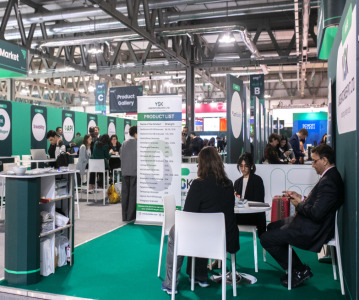Amgen's Talimogene Laherparep?vec Reduced Size Of Melanoma Tumours in New Phase III Retrospect?ive Analysis

Amgen has announced findings from a pre-specified retrospective analysis of patients with metastatic melanoma that showed talimogene laherparepvec reduced the size of injected tumours and also non-injected tumours that had metastasized to other parts of the body.
The analysis recorded tumor-level responses from a pivotal Phase III study evaluating talimogene laherparepvec in patients with injectable unresected stage IIIB, IIIC or IV melanoma compared with granulocyte-macrophage colony-stimulating factor (GM-CSF). Full results were presented 14 March during an oral session at the Society of Surgical Oncology (SSO) 67th Annual Cancer Symposium in Phoenix.
Talimogene laherparepvec is an investigational oncolytic immunotherapy designed to selectively replicate in tumour tissue and to initiate a systemic anti-tumour immune response.
Of the 295 patients treated with talimogene laherparepvec, almost 4000 tumour lesions were tracked for this analysis. Half of these lesions were injected with talimogene laherparepvec at least once, while the rest were not injected, including visceral tumour lesions (tumours involving solid organs such as the lungs and liver). The results showed a 50% or greater reduction in tumor size in 64% of injected tumours. In addition, one-third of uninjected non-visceral tumours, and 15% of visceral tumours were also reduced by at least 50%. There were 35 melanoma-related surgeries performed during this trial of which 30% successfully removed all residual disease.
The most frequently observed adverse events in the Phase III study were fatigue, chills and pyrexia. The most common serious adverse events include disease progression in both groups, and cellulitis and pyrexia in the talimogene laherparepvec group. Serious adverse events occurred in 26% of talimogene laherparepvec patients and 13% of GM-CSF patients. Immune-mediated events were reported infrequently.
"These data add to the body of evidence supporting talimogene laherparepvec's local and distant effect, and its potential ability to stimulate a systemic anti-tumour immune response," said Sean E. Harper, MD, executive vice president of Research and Development at Amgen. "Melanoma remains a devastating and difficult-to-treat disease, and talimogene laherparepvec continues to demonstrate encouraging results in this setting."
Related News
-
News WuXi to sell CGT manufacturing unit to US-based Altaris LLC
At the tail end of 2024, Chinese-based CDMO WuXi AppTec announced the signing of their deal with private equity firm Altaris LLC, confirming the sale of WuXi Advanced Therapies, the cell and gene therapy manufacturing arm of WuXi AppTec. -
News Women in Pharma: Our hopes for 2025 and beyond
Our last instalment for 2024 of the Women in Pharma series brings you messages direct from the Informa Markets CPHI team as they discuss the advice and insights they have carried throughout their roles working at CPHI, and what they hope to see for the... -
News CPHI Milan Wrap-Up Report: Conference Highlights
Discover the emerging and trending topics of the pharmaceutical industry with our CPHI Milan Conference Highlights, with exclusive insight from pharmaceutical leaders and experts! -
News BIOSECURE Act not included in key defense spending bill for 2025
On December 7, 2024, the Biden administration revealed the 2025 National Defense Authorization Act, an annual defense bill specifying the budget and expenditures of the US Department of Defense. The controversial BIOSECURE Act was notably missing from ... -
News Lessons from CPHI Milan 2024: Sunny Intervals for Pharma Manufacturing?
As the 2024 CPHI conference wrapped up in Milan, we caught up with L.E.K. Consulting – a global strategy consulting firm with deep expertise in pharma manufacturing – to discuss evolving market perspectives and business outlook. -
News Trump 2.0: What does the US election result mean for the healthcare industry?
After Trump won the Presidential election in the US in early November, we take a look at some of the implications a new Trump administration could have on the health and pharmaceutical industry, and on US patients. -
News Women in Pharma: Reflections from Behind the Scenes
In this instalment of our monthly series, the team that brings you the Women in Pharma series each month sits down for a heart-to-heart on what the series means to them, and how they hope to continue their work in the future. -
News Scaling the Industry: CPHI Scale-Up Market interview with YSK Laboratories
For the first time, CPHI Milan hosted the CPHI Start-Up Market, expanding support for emerging and small-sized enterprises in their transition to the next level of growth. In this interview, we spoke with Yuvansh Khokhani, Managing Director of YSK Labo...
Position your company at the heart of the global Pharma industry with a CPHI Online membership
-
Your products and solutions visible to thousands of visitors within the largest Pharma marketplace
-
Generate high-quality, engaged leads for your business, all year round
-
Promote your business as the industry’s thought-leader by hosting your reports, brochures and videos within your profile
-
Your company’s profile boosted at all participating CPHI events
-
An easy-to-use platform with a detailed dashboard showing your leads and performance

.png)





